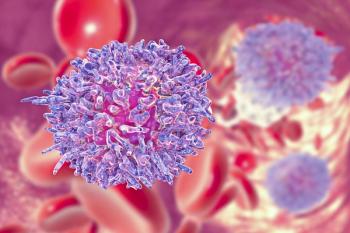
Mental health was recognized as a priority by most oncologists. However, few felt they had the proper resources to provide adequate support. In addition, palliative care was found to be prescribed or referred too late.

Mental health was recognized as a priority by most oncologists. However, few felt they had the proper resources to provide adequate support. In addition, palliative care was found to be prescribed or referred too late.

With estimates pointing to 26.1 million cancer survivors by 2040, the care of these individuals will need to be more than a care plan in their electronic medical record.

Oncology nurses are often the main point of contact for newly diagnosed patients with cancer. We have the opportunity to ensure that each person starts their journey with equality and equity on their side.

Seventy-three percent of advanced practice providers reported that they are interested in becoming more involved with clinical trials.

Patients with high levels of amphiregulin were at a higher risk of an early death in acute graft-versus-host-disease, according to a presentation at the 2021 ASH Annual Meeting.

Belantamab mafodotin is an antibody-drug conjugate that functions by targeting BCMA and has demonstrated clinically meaningful activity in relapsed/refractory multiple myeloma.

Acalabrutinib was linked to a lower incidence of cardiovascular-related toxicities and overall toxicity burden compared with ibrutinib in patients with chronic lymphocytic leukemia.

Axicabtagene ciloleucel improved the quality of life in patients with relapsed/refractory large B-cell lymphoma receiving the agent as a second-line therapy.

Patients with myeloma who reported that their disease was incurable had lower quality of life. However, many patients may also have misconceptions about the curability of their disease.

On this episode of “The Vitals,” an expert in genetics discusses ongoing research to address cisplatin-induced hearing loss in pediatric patients with cancer.

Abatacept is now available for use in combination with certain immunosuppressants to prevent moderate to severe acute-graft-versus-host disease for select patients who have received unrelated donor hematopoietic stem cell transplant.

A presentation at the 2021 ASH Annual Meeting revealed a significant association between elevated white blood counts and thrombotic events among patients with polycythemia vera and controlled hematocrit levels.

Ibrutinib, both in the frontline setting and in the form of continuous treatment, was associated with improved quality of life over chemoimmunotherapy for patients with chronic lymphocytic leukemia.

If patients with cancer experience depression or anxiety, it can result in low clinical trial enrollment.

Tisagenlecleucel evoked similar efficacy and a preferrable safety profile in children and adults with B-ALL being treated in a real-world analysis, compared with the clinical trial ELIANA.

In comparison to physicians’ choice of treatment, ciltacabtagene autoleucel demonstrated significant advantages in progression-free and overall survival, time to next treatment, and overall response rate.

Combining ibrutinib with rituximab resulted in improved 2-year progression-free survival among elderly patients with previously untreated diffuse large B-cell lymphoma.

Findings presented at the 2021 San Antonio Breast Cancer Symposium suggest that Certain adverse effects associated with olaparib were minimal and resolved with appropriate management in patients with breast cancer.

Findings from a breast cancer analysis demonstrated that pathologic complete response and event-free survival rates were not significantly affected by patient’s race.

The introduction of adjuvant approaches reduced the risk of disease recurrence in HER2-positive, early-stage breast cancer.

Treatment modifications were inconsistent among White and Black patients with breast cancer. However, the use of a multiscale biophysical modeling platform may be useful in informing treatment modification decisions.

Findings from a pooled efficacy and safety analysis support the use of palbociclib plus endocrine therapy in patients who are Black or Hispanic with hormone receptor–positive, HER2-negative breast cancer.

Aromatase inhibitors were revealed to be more effective than tamoxifen in reducing the rate of recurrence in ER+ breast cancer among premenopausal women receiving ovarian suppression.

The 24-month lymphedema rate was 39.4% among Black women, making it the highest incidence rate in any category.

Patients who received matched targeted therapy specific to their genomic alteration, as identified through multigene sequencing, experienced significantly improved progression-free survival.

A retrospective study presented at the 22nd SUO Annual Meeting revealed that pelvic organ–preserving robot-assisted radical cystectomy allowed women to return to sexual activity post-surgery.

Researchers identified a linear decrease in the likelihood of surgery once patients with localized prostate cancer reached a BMI of 33 or greater.

Hispanics are the largest ethnic minority and one of the most rapidly growing populations in the United States. Prostate cancer represents the highest incident non-cutaneous malignancy in this population.

A secondary analysis of 2 treatment alterations studies demonstrated that 18F-fluciclovine PET/CT scans play a pivotal role in determining if androgen deprivation therapy is appropriate for patients with prostate cancer.

Pembrolizumab has been approved for the adjuvant treatment of adults and pediatric patients with stage IIB or IIC melanoma who have underwent complete resection.